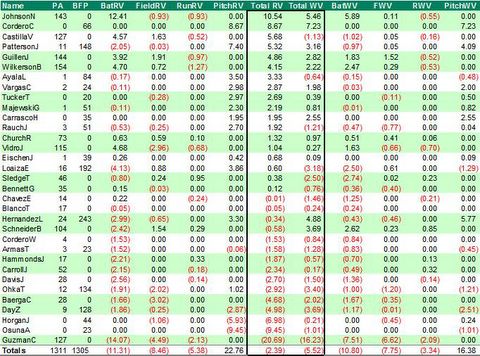Friday Morning Figures, May 13
Here's the latest total RV and WV for the Nats, through May 12.
Notes:
-- The WV figures ("Win Value") are based on the new system I mentioned here (someday I will have time to explain it in detail). The bottom line is that Win Value translates every run into a "go-ahead run" situation, so that 1.0 WV = the average "go-ahead" run (at any point in the game, for either the home or visiting team). So, reading the chart below, Cristian Guzman's fielding has cost the Nats over 6 go-ahead runs this season.
-- Note that there is a subjective element to all of this, in that I make judgments about whether fielders should have made plays, runners should have taken the extra base, etc. Whenever possible I solicit others' views on those plays to check if my judgment was right. Ideally we would have a large group of people make such judgments and we could average them to get the most accurate value. These situations are relatively rare, but that judgment does affect the running and fielding RVs particularly.
-- One tentative conclusion I have come to from doing all of this (which may be obvious to many, I know) is that fielding and running are a lot like things in life: there is little upside and lots of downside, in that you are "productive" in them by avoiding a screw-up, rather than affirmatively adding value. Hence most of the RVs for these two are going to be negative, probably.

(Click on chart for larger image)



5 Comments:
Alright... I'm trying to wrap my lil mind around Cordero's numbers.
There's no bonus in RV for late-game situations, right? It's based strictly upon the state the game is on from AB to AB.
That being the case, wouldn't Cordero's RV be artificially high because he's constantly putting runners on before escaping?
I'm guessing there's more value in escaping a bases loaded situation than you'd lose for loading the bases in the first place, giving him a net positive?
It's also helped that he's been lucky in terms of not allowing runs, or being 'bailed out' by Guzman's error, for example.
Good questions, Chris. Dexys has explained it. Essentially, if a pitcher starts an inning and gets out of it with no runs, he gets 0.53 RV, regardless of how many runners got on. I read that Cordero has given up only 1 ER in his last 15 innings, so that is 6.5 RV (roughly) right there (15 * .5 - 1).
And you are right that errors can help increase a pitcher's RV, because he gets credit for the out that should have happened, and if he gets out of the inning with no runs, it's like he got "four outs" so his RV will reflect that.
I guess I just haven't realized how dominant he's been from a run prevention aspect.
But, I'd argue (and this has nothing to do with the RV stat) that he's been exceedingly lucky. You can't have the kind of ERA he has with the kind of WHIP he's allowing over a full season.
Good point, Chris, and that's why I've started tracking the stat ERVF for pitchers. It essentially adds up all of the expected runs for each plate appearance a pitcher is involved in. For example, on a three-up, three-down inning, ERVF is 0.92. The first batter comes up with the team expected to score 0.53 runs. He goes out, and the next guy comes up with a 0.28 ERV for the team. He goes out and it drops to 0.11 (none on, two outs).
If a pitcher does the Molly Hatchett ("flirtin with disaster"), his ERVF will be much higher, because guys will be coming to the plate in much better scoring positions.
RV divided by ERVF seems to give a good indication of how efficient a pitcher, and, when I get home tonight, I'll post on what Cordero's is relative to other pitchers.
K --
Thanks for the compliments.
RV is inning-independent. Same RV for the same situation in the 1st as in the 9th. WV is RV adjusted to reflect the inning and score (expressed as the probability of winning).
On catcher's stopping wild pitches: I've thought about that, but haven't pulled the trigger. My test is whether the average catcher would have stopped the ball. In every case I've seen so far, that was the case. For a passed ball, the catcher gets a fielding debit for the base runner advance. If the pitcher gets out of the inning, then he will get a higher RV than normal, just as with any other error.
Post a Comment
<< Home